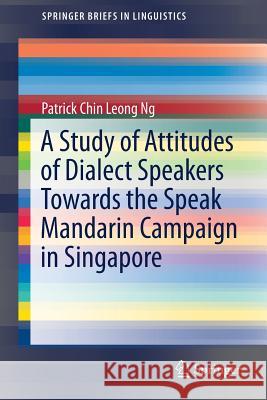A Study of Attitudes of Dialect Speakers Towards the Speak Mandarin Campaign in Singapore » książka
topmenu
A Study of Attitudes of Dialect Speakers Towards the Speak Mandarin Campaign in Singapore
ISBN-13: 9789811034411 / Angielski / Miękka / 2017 / 81 str.
Kategorie:
Kategorie BISAC:
Wydawca:
Springer
Seria wydawnicza:
Język:
Angielski
ISBN-13:
9789811034411
Rok wydania:
2017
Wydanie:
2017
Numer serii:
000770742
Ilość stron:
81
Waga:
0.15 kg
Wymiary:
23.39 x 15.6 x 0.53
Oprawa:
Miękka
Wolumenów:
01
Dodatkowe informacje:
Wydanie ilustrowane











